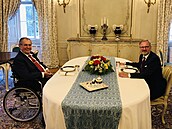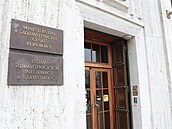A depressing picture of a crony, kleptomaniac and degenerating democracy where parties and public interests have been colonized by private business and crime has been painted by Czech speakers at a Prague conference on the reform of party political and campaign funding.
“The Czech Republic has become the Las Vegas of Europe,” commented Michal Klíma, a political scientist at the Metropolitan University in Prague. “This is the gaming republic; there are more gaming machines per capita here than anywhere else in Europe,” he added, referring to betting and lottery companies success in framing legislation to suit their purposes, in particular a favored tax status in return for payments to non-transparent organizations and “charities.”
Klíma said the process of clientelism, already developed by the two biggest Czech political parties, the main opposition center-left Social Democrats (ČSSD) and the center-right Civic Democrats (ODS), had been elevated to a new level with the entry of the Public Affairs (VV) party in government in 2010. ODS, VV and TOP 09 comprise the current coalition government.
‘VV is a new step forward in political degeneration.’
“VV is a new step forward in political degeneration,” Klíma commented, referring to party leader’s remarks setting out the clear goal of entering politics to create business opportunities for the security firm, ABL, founded by party paymaster Vít Bárta, who was pushed to resign as transport minister.
The leadership of the bigger political parties had been weakened and could no longer control their regional branches, often in the hands of local business “godfathers” thanks to their recruitment of non-existent party members and generous party funding, Klíma added.
Prominent political commentator Jiří Pehe, the chairman of the civic association organizing the conference, the Center for a Social-Market Economy and Open Democracy (CESTA) [the acronym means “path” in Czech], said he saw a new danger from globalization and the fact that foreign business interests are now pushing their interests through Czech political parties and the government.
Whereas local business interests and those of the state and citizens might have largely overlapped in the past, this was no longer necessarily the case with foreign firms or multinationals. “We now have global capitalism and we do not know who these people are and what they want or the influence they have locally,” Pehe, a former political advisor to president Václav Havel, told Czech Position.
Examples of how foreign firms were attempting to use their influence include the Gripen scandal (in which the ČSSD in particular is suspected of corruption over the massive tender to supply jet fighter aircraft to the Czech Army by British arms supplier BAE Systems and Sweden’s SAAB) and the more recent scandal over the inflated order and prices paid by the Ministry of Defense for Austrian-produced Pandur armored personnel carriers, Pehe said.
‘We now have global capitalism and we do not know who these people are and what they want or the influence they have locally.’
His warning of globalization’s tendency to sweep aside or recruit national and regional institutions for its ends was echoed by Prague School of Economics (VSE) professor Vladimira Dvořáková. “These corporations do not care about building infrastructure or education, all they care about is getting the right investment conditions,” she said.
US ambassador to the Czech Republic Norman Eisen, President Barack Obama’s former “ethics czar,” was a lonely beacon of optimism that political parties could be redirected away from representing private and back to their real mission of standing up for the public interest at the conference’s opening session. Eisen’s optimism is, however, based on the Czech Republic adopting an ambitious set of anti-corruption measures set out a Council of Europe group, GRECO.
“If the Czech Republic follows these recommendations based on transparency, then you will have made significant strides in limiting the links between money and politics,” Eisen commented. He admitted that the US was far from having all the answers on party financing and limiting private interests, with the Supreme Court dismantling a key move to curb corporate financing of election campaigns and the Obama administration failing so far to remedy the damage.
Curbing party influence
Klima’s remedy for the takeover of Czech political parties by private interests is to sharply curtail their influence and make sure they no longer have a preponderant influence in such areas as the police, public prosecutors service, competition watchdog, courts, and public radio and television broadcasters.
The parties themselves had to be reformed with stringent new internal rules, financing guidelines and organizations, he said. Czech civil society had to be strengthened as well, he said, because apathy is the best environment for corruption and the distortion of public interests.
“You will not get reform of political parties without the revitalization of civic society and you will not get democratic reform without the revitalization of political parties,” Klima warned.
The Czech Ministry of Interior is currently drawing up proposals to reform party and campaign funding with the current system where parties essentially govern themselves widely attacked for its lack of teeth and transparency. Key proposals aimed at dealing with corruption in public tenders, a source of party funding, are also progressing through parliament at the moment.














